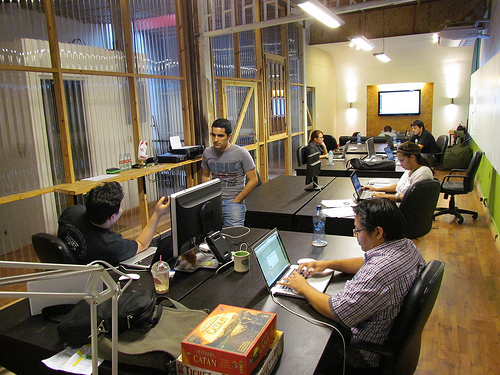The global coworking movement is (finally) starting to get attention from both big industry and main stream media. But sometimes, old reporting paradigms die hard.
A few days ago, the Wall Street Journal published a piece about how solo entrepreneurs who started out in shared office spaces are looking to continue coworking as they grow and add employees.
Sounds great, right? Finally, more people will see that the principles of coworking don't only apply to freelancers and one-person businesses. Growing companies can also take advantage of the community support and built-in mentoring that coworking provides.
This year, we’ve seen Mutual Aid in Motion.
From scaling sharing hubs to Mutual Aid 101 trainings, we’re helping communities build the tools they need.
Every dollar fuels lasting resilience – proving that when we move together, we all move forward.
But then the other shoe drops. True to form, the WSJ must present an opposing viewpoint to balance out the piece.
As you grow, there's a need for confidentiality," says George Deeb, founder and managing partner of Red Rocket Partners, a start-up consulting firm in Chicago. "You have human-resources issues. You need to protect your paper and electronic files. And when you are working with a large client, they want to know about security, too." Also, he cautions, collaboration could turn messy if an employee gets too close to other start-ups occupying the space. "I don't want another company to romance my guys away," he says.
This implies that a coworking space can only meet a business' needs up to a certain point. And once that critical mass is reached, the only option is to move out on your own where all your secrets, and your best employees, can be kept under lock and key.
This is not only a narrow perspective of why startups exist, it also sells short the coworking community, which has helped launch some of the world's most innovative and exciting companies.
First, it assumes that all startups dream of getting big, dominating their markets, and moving into giant office buildings. But of course, this isn't always the case. As we see over and over in the sharing economy, many businesses spring up to meet a community need, or facilitate a better way of life. These businesses put people and the planet before their quest for profit. They're interested in sharing what they know, giving people access to the things they develop, and watching an uplifting concept be dulplicated again and again.
Second, this cautionary comment implies that the community can't be trusted. Without walls, any passer by might be able to see a design you're working on, overhear a conversation about a big client, or (gasp!) offer their feedback on an unlaunched product. Yes, trust and security is important, especially between clients and the companies they hire. But it's time to move away from this notion that sharing ideas or working in a free-range environment is tantamount to giving away the farm.
Business doesn't have to be about competition. More and more, we're seeing businesses embrace collaboration instead. In most cases, making friends of those whom might otherwise be considered enemies brings quality products to market faster and opens up a larger customer base.
A coworking community, no matter what the size or shape, is about people and relationships. When members know and care about one another, they become invested in each other's success. Stealing employees or company secrets would only hurt the community, and destroy the sense of trust and support that attracts so many to coworking in the first place.
No, a company with 25 employees might not be able remain in the 3 room coworking space in which it was born. It might have to move to an incubator or a much larger coworking space in a bigger city. But growth needn't preclude the open sharing of ideas and support that helped it get there.
Did your business grow up in a coworking space? Did you find a way to stay, or did concerns about security compel you to seek out a solo office? Tell us in the comments!

